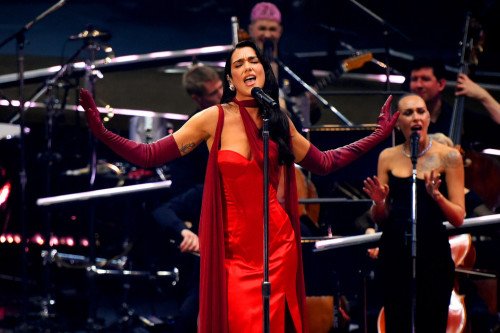Dua Lipa has gained the copyright case over her music ‘Levitating’.
Dua Lipa has gained her copyright case
The 29-year-old singer had been accused by songwriters L. Russell Brown and Sandy Linzer of ripping of their 1979 music ‘Wiggle and Giggle All Night time’ on her 2020 single, however on Thursday (27.03.25), US District Choose Katherine Polk Failla dismissed their lawsuit after ruling there was not a “substantial similarity” between the 2 tracks.
The decide cited a ruling from final 12 months which established Ed Sheeran hadn’t ripped off Marvin Gaye and famous each ‘Levitating’ and ‘Wiggle and Giggle All Night time’ had similarities to music from a variety of artists, together with Mozart, Gilbert and Sullivan, Gioachino Rossini and the Bee Gees.
The decide wrote: “The Court docket finds {that a} musical fashion, outlined by Plaintiffs as ‘pop with a disco really feel,’ and a musical perform, outlined by Plaintiffs to incorporate ‘leisure and dancing,’ can’t probably be protectable — alone or in tandem — as a result of … [that would] fully foreclose the additional growth of music in that style or for that function.”
The 2 songwriters – who had additionally claimed ‘Levitating’ integrated components of ‘Don Diablo’, a 1980 Miguel Bose music to which they personal the copyright – “respectfully disagree” with the court docket’s ruling and are planning to enchantment, their lawyer Jason T. Brown informed Individuals journal.
He additionally mentioned in an announcement: “This case has at all times been about standing up for the enduring worth of unique songwriting, and we proceed to imagine within the power of Mr. Brown and Mr. Linzer’s inventive legacy.
“Even the protection skilled acknowledged that folks can hear the similarities between ‘Don Diablo’ and ‘Levitating’. However beneath current case legislation — together with the Structured Asset Gross sales v. Sheeran choice — courts have grow to be more and more centered on what could be dissected and filtered out on paper, fairly than what’s felt by means of the music itself.
“There’s a rising disconnect between how these instances are determined — by academically analysing briefs, bar traces, and musical notation — versus how audiences really expertise music. The soul of a music doesn’t reside in a court docket temporary. It lives within the sound, the texture, and the efficiency — and that’s what juries must be allowed to listen to and decide.”
